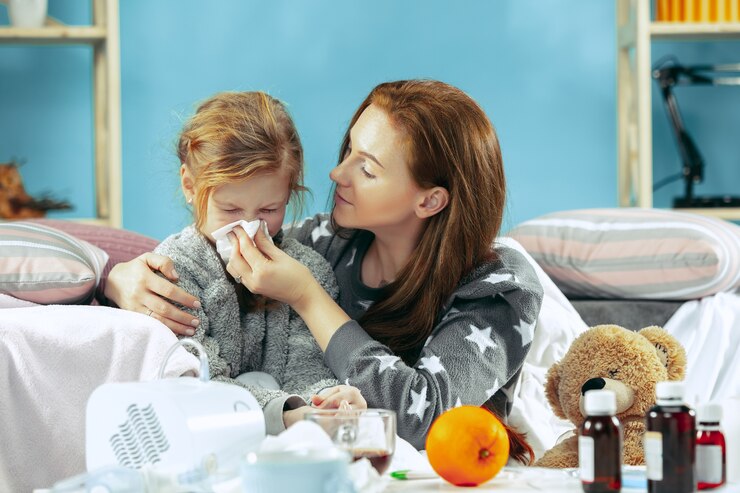It’s 3 am, and your child’s forehead feels hot. They’re restless, whimpering, and their cheeks are flushed. A wave of panic washes over you – viral fever? While a fever in children can be concerning, it’s essential to stay calm and understand the situation.
This comprehensive guide from Nectar Health, your trusted resource for pediatric care, will equip you with the knowledge and tools to navigate your child’s viral fever.
Understanding Viral Fever in Kids
Viral fever is a common childhood illness caused by viruses like the common cold, flu, or respiratory syncytial virus (RSV). It’s the body’s natural response to fight infection, raising its temperature to create an unfavorable environment for the virus to thrive.
Symptoms of Viral Fever in Kids
While a fever is the hallmark symptom, other viral fever symptoms in kids can include:
- Runny or stuffy nose
- Cough
- Sore throat
- Body aches
- Headache
- Loss of appetite
- Fatigue
- Irritability
It’s important to note:
- The severity of symptoms can vary depending on the specific virus and your child’s individual immune system.
- Not all viral fever in children will present with all these symptoms.
Viral Fever Duration in Children
The duration of a viral fever in children can vary depending on the specific virus and the child’s individual immune system. Generally, viral fevers last for 3-5 days, but some may resolve within 24 hours or extend up to 7 days.
When to Seek Medical Attention
While most viral fevers in children are self-limiting and require only home care, there are situations where seeking medical attention is crucial. Here are some red flags:
- Fever exceeding 104°F (40°C) in infants under 3 months
- Fever exceeding 103°F (39.4°C) in children 3-6 months old
- Fever exceeding 102°F (38.9°C) in children over 6 months with no other symptoms
- Fever accompanied by a stiff neck, severe headache, or confusion
- Persistent vomiting or diarrhea
- Difficulty breathing
- Signs of dehydration, like decreased urination or sunken eyes
- Fever lasting for more than 3 days in infants or 5 days in older children
Treating Viral Fever at Home
While medications can help reduce fever, they don’t attack the underlying virus. Here are some home remedies to help your child feel better:
- Plenty of fluids: Encourage water, milk, or clear broths to prevent dehydration.
- Rest: Allow your child to sleep and recover.
- Fever-reducing measures: If the fever is causing discomfort, you can use a lukewarm (not cold) bath or sponge bath, or dress your child in lightweight clothes.
- Over-the-counter medications like acetaminophen or ibuprofen can be used under the guidance of your pediatrician.
- Offer soothing remedies: A humidifier can help ease congestion, and saline nasal drops can loosen mucus.
- Nectar Health Tip: Ensure you use the correct dosage of medication based on your child’s age and weight. Never give aspirin to children under 18 due to the risk of Reye’s syndrome.
Preventing Viral Fever in Kids
Here are some key strategies to prevent viral fever in children:
- Frequent handwashing: Teach your child to wash their hands with soap and water for at least 20 seconds, especially after being in public places or around sick individuals.
- Good hygiene: Encourage covering their coughs and sneezes with a tissue or their elbow.
- Healthy lifestyle: Promote a balanced diet, adequate sleep, and regular exercise to strengthen their immune system.
- Vaccinations: Keep your child’s vaccinations up-to-date according to the recommended schedule.
Nectar Health: Your Trusted Partner in Children’s Health
While managing a viral fever at home is often possible, Nectar Health is here to support you every step of the way. We offer a team of experienced pediatricians and resources to answer your questions and provide guidance. You can schedule an online appointment with a pediatrician to discuss your child’s specific situation and receive personalized advice.
Additional Tips:
- Monitor your child’s temperature regularly to track their progress.
- Offer lukewarm baths to help bring down their temperature, but avoid using cold baths as they can be counterproductive.
- Avoid using medications unless recommended by your doctor, as some medications can worsen certain viral illnesses.
- Maintain good hygiene: Wash your hands frequently and encourage your child to do the same to prevent the spread of germs.










